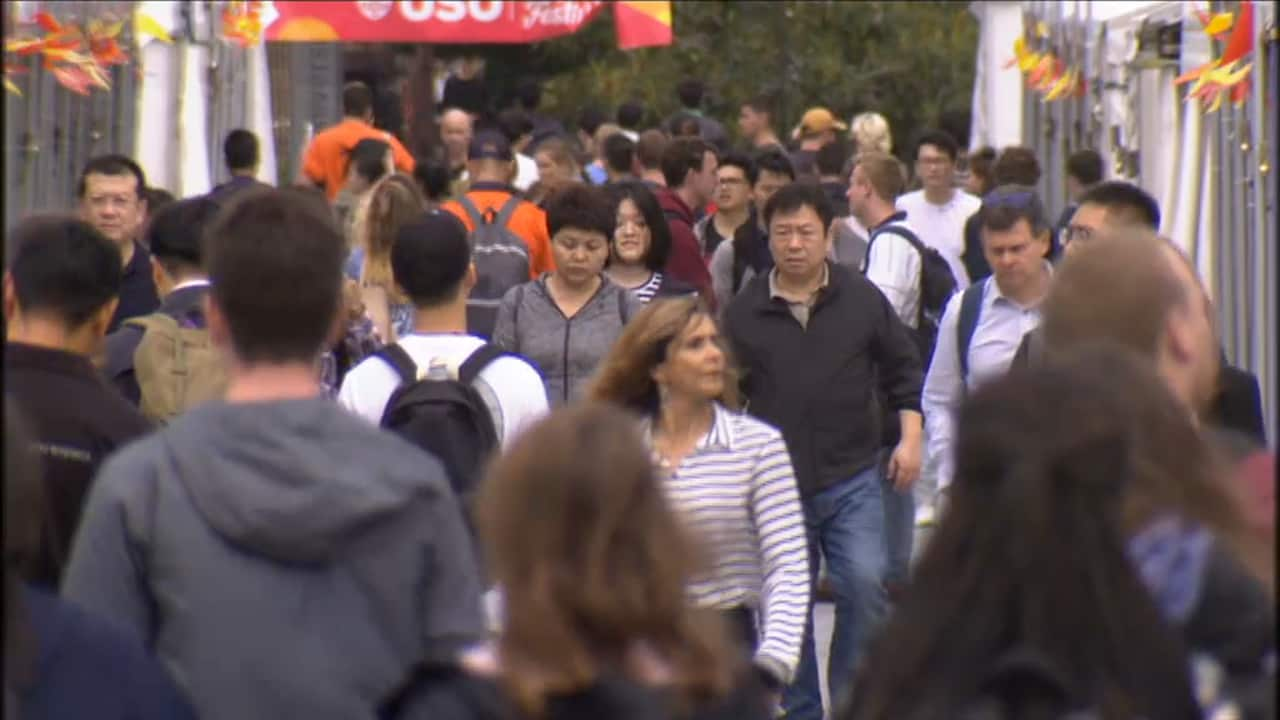At least seven of Australia's major universities rely heavily on Chinese international students for revenue and that is putting the institutions at risk of financial collapse, a from libertarian think tank the Centre for Independent Studies has claimed.
According to the report, released on Wednesday, the financial risk of the universities' reliance on China ran into the hundreds of millions of dollars annually, with Chinese student course fees accounting for between 13 and 23 per cent of their total revenues.

Salvatore Babones said Australian universities need to reduce their international student intake. Source: SBS News
The author of the report, Salvatore Babones, told SBS News the problem wasn't that the students were Chinese, but that "there is so many of them".
"It's healthy to have foreign students, the problem is when you have so many foreign students that you depend on them for your financial survival," he said.

Australian universities are increasingly reliant on Chinese international students, a new report has found. Source: SBS News
The report found that approximately 10 per cent of all students currently at an Australian university come from China, compared to international students more broadly, which account for 25 per cent.
"At the University of Sydney, for example, Chinese students make up one out of every 10 students. That's just an extraordinary number to have at one university," Dr Babones said.
He said the risk, was simply, that these large numbers of students could leave on mass, for political, reputational or financial reasons.
"We see the trade war going on now between the US and China that puts severe pressure on China's economy and China's currency. That could blowback in the face of Australian universities in a sudden withdrawal of Chinese students," he said.

According to the report, the University of Sydney generated more than half a billion dollars from Chinese student course fees in 2017. Source: Supplied
"The problem is that Australian universities have made a long term bet that their international student numbers will continue to rise forever."
'Economical not political'
Recently, Chinese students have been in the spotlight after the tensions in Hong Kong spilled onto Australian campuses.
Conflicting views around Hong Kong and Chinese national identity came to a head at the University of Queensland last month, when a peaceful Hong Kong solidarity protest was met with a counter-protest led by.
Since the clash, students disclosed fearing that their political behavior in Australia will be documented and sent to the Chinese government.

University of Queensland students from Hong Kong have built a solidarity ‘Lennon Wall’ - a collaged display of support messages to the protesters in Hong Kong. Source: The Feed
But it's financial reasons that Dr Babones believes would be the most likely to affect Chinese student enrolments in Australia.
"China has experienced 40 years of continual economic growth," he said. "But that is coming to an end."
"If the Chinese Yuan was to suddenly collapse in value, which is very possible with the current Trump trade-war going on, that could double or triple the cost of an Australian education for a Chinese family."
Universities respond
The peak body for Australia's university sector, Universities Australia, told SBS News international education was a "great Australian success story".
"By building it up over 50 years, we've enhanced the quality of education for local, domestic and international students," its chief executive Catriona Jackson said.

Catriona Jackson, chief executive of Universities Australia. Source: SBS News
All seven universities identified in the report - University of Melbourne, Australian National University (ANU), University of Sydney, University of New South Wales (UNSW), University of Technology Sydney (UTS), University of Adelaide and the University of Queensland - also told SBS News that Chinese international students made a valuable contribution to their institutions and Australia, but some acknowledged the need for diversification.
"We appreciate diversification of income is important for any large organisation which is why we have an income diversification strategy," a University of Sydney spokesperson said.
"We’ve already seen an increase in students from the USA and Canada and we’re working to increase the number of our students from India and Southeast Asia."
Meanwhile, a University of Queensland spokesperson told SBS News they were focused on recruiting students from emerging markets, such as India, Indonesia, and Latin America.
"While other universities are more highly geared to China and to international students in general, UQ acknowledges the importance of diversifying the mix of international source countries," they said.
Dr Babones said all universities are currently seeking to expand into the Indian market, but that India is "too poor" to serve as a replacement if Chinese students were to leave.
"My estimate that there are about one-eighth as many families in India that can afford an Australian university education as there are families in China. The numbers just aren't there in India," he said.
Andrew Norton, the higher education program director at the Grattan Institute, agreed that universities were trying to diversify their international student intake, but China was still essential.

Andrew Norton, higher education program director at the Grattan Institute. Source: SBS News
"The difficulty is that there are no countries with populations as big as China's and middle classes as big as China's," he said.
"Even though they are taking students from other countries, if they want that extra money China is necessary."
The report recommended that Australian universities start implementing plans to reduce their international student intake to "manageable levels".
“They [universities] should act now to mitigate the risk of a sudden revenue collapse by raising admissions standards and reducing international student enrolments," Dr Babones said.



